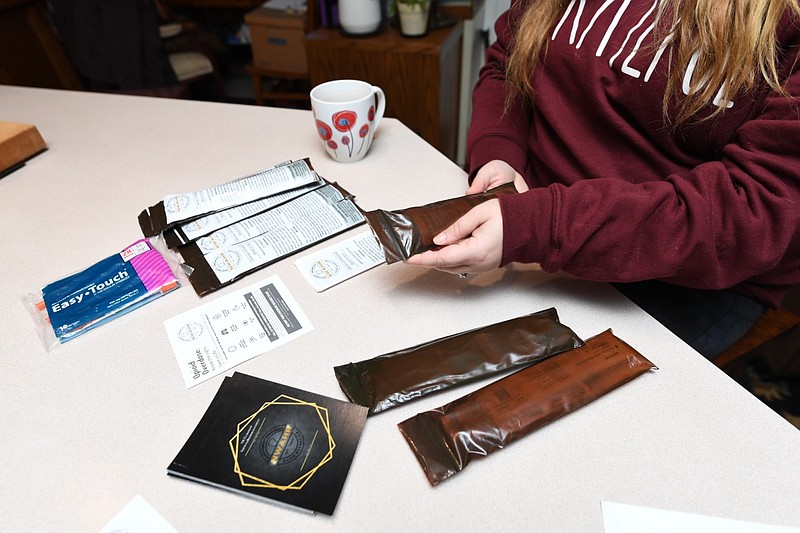FAYETTEVILLE -- Chris Jones has seen drug abuse from both sides, spending time in prison and going through drug court before finding a life helping others.
"I believe recovery is possible for everyone, if they can stay alive long enough," Jones said in a recent interview.
Jones, a certified peer support specialist in Arkansas, is working with Northwest Arkansas Harm Reduction to help people who are using drugs stay alive and work toward changing their lives.
Part of the work being done by NWA Harm Reduction includes providing fentanyl test strips, syringes, condoms and naloxone overdose reversal kits to people who are using drugs. The group also helps people ready to find services to help them end their addiction.
Brittany Kelly, founder of NWA Harm Reduction, said that since November the group has given out 372 naloxone kits, 401 fentanyl test strips, 490 syringes and 66 condoms. She said from information received from those who have used the services the group provides, she believes the work has saved at least 40 lives in that time.
As part of their work, the group has also been lobbying for changes in the state's drug laws making possession or use of fentanyl test strips a felony. According to the Centers for Disease Control and Prevention, the test strips can be used to detect fentanyl in many kinds of drugs and drug forms, both pills and injectibles, and reduce the risk of overdose.
At least two bills are pending in the state Legislature to address the test strips' classification as drug paraphernalia. Kelly said she's pleased the effort to change Arkansas drug laws has gained support.
"It will help people who are seeking help," Kelly said.
Jones, 37, of Rogers said he has been in prison in Arkansas and Missouri for car theft and other crimes. Drug abuse was a part of his lifestyle from his teen years until he chose to change, he said.
"I decided I was tired of tucking my kids into bed over the phone from prison," he said.
Jones said the Benton County Drug Court program "saved my life" and after he completed that program, he wanted to help others. He remained active with the drug court program and began working for a local recovery center.
Jones said he became aware while working in recovery support efforts that Arkansas law declared fentanyl test strips to be drug paraphernalia and decided he didn't care about the risk of going back to prison if he was helping save lives.
"It's a risk I'm willing to take," he said. "I'm really tired of burying my friends because they didn't know what they were buying. I understand that what I'm doing is against the law. I understand that using drugs is illegal, but I don't believe it needs to be a death sentence."
The CDC says fentanyl is a synthetic opioid up to 50 times stronger than heroin and 100 times stronger than morphine. It is often added to other drugs because of its extreme potency, which makes drugs cheaper, more powerful, more addictive and more dangerous.
Jones said the risk of unknowingly ingesting fentanyl has changed the environment in which people use drugs.
"When I was doing drugs, I knew I was going to wake up," he said. "People today don't have that option."
According to the federal Drug Enforcement Administration, many people are overdosing on fentanyl who thought they were taking other drugs. The agency reported seven "mass-overdose events" involving 58 overdoses and 29 overdose deaths in just a two-month period of 2022.
"Many of the victims of those mass overdoses thought they were ingesting cocaine and had no idea they were in fact ingesting fentanyl," the agency reported.
Jones said he has been working for the past few years to persuade Arkansas legislators to change the drug paraphernalia laws to remove test strips from the description of drug paraphernalia.
State Sen. Justin Boyd, R-Fort Smith, introduced Senate Bill 40, which would decriminalize test strips in Arkansas, excluding the test strips from the definition of drug paraphernalia.
Boyd said an article in the Northwest Arkansas Democrat-Gazette alerted him to the growing fentanyl problem. He said he gathered more information at a legislative conference on the nationwide opioid abuse issue and was also contacted by Kelly and others working with the Northwest Arkansas Harm Reduction Foundation.
Boyd, who owns a pharmacy in Alma, said criminalizing the test strips makes no sense to him.
"Why would the state say 'You're going to prison for possessing fentanyl test strips?'" Boyd said.
Boyd said his bill would bring Arkansas law in line with what is happening in other states. He said he has "deferred" the bill because a larger bill also includes the test strip provision, but he will run his bill if needed.
Senate Bill 283, also known as "The Fentanyl Enforcement and Accountability Act of 2023," is also pending in the state Legislature. The bill would establish a "death by delivery" statute meant to hold dealers responsible for any overdose deaths tied to their drugs. Those who deal fentanyl could be charged with "aggravated death by delivery" and face 20-60 years or life in prison and a $1 million fine if prosecutors can tie it to an overdose death.
Another provision of the bill would change state law on fentanyl test strips so they would no longer be considered drug paraphernalia if the bill passes.
The emergency clause attached to the bill, which would make it take effect immediately upon passage, states in 2021 the State Crime Lab did autopsies in 496 drug overdose deaths and, of those, 282 involved fentanyl. In 2016, according to the bill, there were 207 overdose deaths and only eight involved fentanyl.
Boyd said he reached out to the state's prosecuting attorneys about the changes regarding the test strips and received no pushback from them.
Washington County Prosecuting Attorney Matt Durrett is president of the state Prosecuting Attorneys Association. Durrett said the group discussed the proposed changes regarding the test strips and he heard no opposition to it. Durrett said he couldn't remember prosecuting a case involving the use of test strips.
[DOCUMENT: Read the bill on fentanyl test strips » arkansasonline.com/35sb40/]
"We were fully supportive of that bill," Durrett said of Boyd's bill. "The feeling was that it's a very good idea, especially in this day and age. Fentanyl is so dangerous and so deadly. A lot of the people overdosing on fentanyl are unknowingly taking it because it's mixed in with other drugs. Drug paraphernalia is generally meant to be things used to ingest, inject, inhale or otherwise to use drugs and to manufacture or sell a controlled substance. The use of test strips is a way to save lives."
The criminalization of "testing equipment" under state and local drug laws goes back to at least the 1970s, according to information gathered by the Legislative Analysis and Public Policy Association in a report titled "Drug Paraphernalia: Summary of State Laws."
According to information in the report, after many state and local drug laws were challenged in courts, the DEA drafted a "Model Drug Paraphernalia Act" in August 1979. That draft act, which included testing equipment in its definition of drug paraphernalia, was adopted by 38 states and the District of Columbia within a few years and remained largely unchanged for more than 30 years. Other states adopted similar laws.
The Legislative Analysis report also said 49 states and the District of Columbia have "one or more criminal laws" pertaining to drug paraphernalia, with Alaska being the lone exception. As of March 2022, the use of test strips and/or testing equipment was legal for at least some individuals in 25 states and illegal for all individuals in 25 states unless the state had a "Good Samaritan" law, providing an exception in cases involving efforts to prevent fatal overdoses. In seven states, testing equipment is included in the definition of drug paraphernalia but there's no criminal penalty for using or possessing the equipment.
According to the report, efforts to change the laws regarding testing equipment are underway in many states. In 2022, changes were approved or pending in at least 11 states where the use of testing equipment is not allowed -- including California, Washington, Utah, Kansas, Missouri, Louisiana, Georgia, Ohio, Pennsylvania, Massachusetts and Connecticut -- while similar efforts failed in Florida, Mississippi and New Jersey. According to news reports, bills have been introduced in Texas and Mississippi this year to allow the use of test strips, and the governors of Ohio and Pennsylvania recently signed laws decriminalizing test strips.
In a report released in April, the DEA described fentanyl as "highly addictive" and said it was found in all 50 states. The agency said drug traffickers are increasingly mixing fentanyl with other drugs -- in powder and pill form -- "in an effort to drive addiction and attract repeat buyers." The drug dealers sell their products as cocaine or as pills made to look like legitimate prescription pills.
"This is creating a frightening nationwide trend where many overdose victims are dying after unknowingly ingesting fentanyl," the agency said in the report.
"Fentanyl is driving the nationwide overdose epidemic," the agency reported. "The CDC estimates that in the 12-month period ending in October 2021, over 105,000 Americans died of drug overdoses and over 66% of those deaths were related to fentanyl and other synthetic opioids. Last year (2021) the United States suffered more fentanyl-related deaths than gun-related and auto-related deaths combined."
[DOCUMENT: Read the bill on fentanyl test strips » arkansasonline.com/35sb40/]

